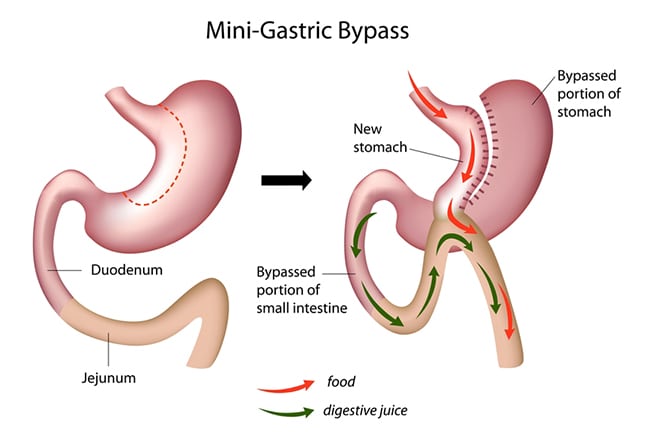
Enjoy a healthier lifestyle with Gastric Bypass surgery.
Widely considered the gold standard for weight loss surgery, laparoscopic gastric bypass is also one of the most reliable procedures in terms of what the average outcome is for many patients. A gastric bypass promotes the loss of excess weight by restricting how much food can be consumed at any one time and decreasing absorption.
- When performed laparoscopically, a gastric bypass is a less invasive procedure that involves a series of small incisions.
- For patients who qualify for the procedure, it may lead to positive long-term health benefits.
CONTACT US TODAY
What It Does & How It Works
In summary, laparoscopic gastric bypass changes how food is processed and consumed. A small pouch is created and food absorption is minimized by cutting off most of the stomach and upper intestines from contact with any of the food that’s processed. This is accomplished by connecting the small pouch to the small intestine to allow for part of the digestive process to continue without as much absorption.
How It’s Performed
Five or six small incisions are made to perform a laparoscopic gastric bypass. A small scope with a camera attached is placed through one of the incisions to provide visual guidance for the surgeon. The top part of the stomach is stapled to the stomach to create the small new pouch, which will be where food will go as part of the digestive process after the procedure is completed. The jejunum, a part of the small intestine, is then attached to the newly created pouch to allow food to “bypass” the duodenum, or the lower portion of the stomach, to reduce calorie intake.

Possible Advantages *
The average weight loss experienced with a laparoscopic gastric bypass is typically significant if post-operation instructions are followed. According to studies referenced by the American Society for Metabolic and Bariatric Surgery (ASMBS), weight loss a year after surgery is nearly 80 percent of initial excess weight. More than half of all patients who have laparoscopic gastric bypass are able to maintain that weight loss more than ten years after surgery, according to various studies analyzing long-term results of gastric bypass procedures. Patients may also notice and experience:
- Improvements with weight-related health conditions
- Less instances of lower back pain
- More productive sleep
- Improved self-esteem
- Less stress and anxiety
Candidates for Laparoscopic Gastric Bypass
Patients typically undergo an extensive screening process to determine if they are good candidates for a weight loss procedure like laparoscopic gastric bypass. Other weight loss attempts must have been tried without significant success to be considered. Patients must also have a body mass index of 40 or higher or a BMI ranging from 35 to 39.9 with a health issued related to weight, such as chronic high blood pressure or diabetes.
Pre-Surgery Considerations
Any type of weight loss surgery should be viewed as a tool for weight loss, not a magic cure or quick-fix solution. While rapid weight loss is often experienced with a laparoscopic gastric bypass, patients sometimes reach a point where weight loss slows or levels off. These fluctuations are perfectly normally and shouldn’t be considered a sign of failure. Patients often benefit from laparoscopic gastric bypass if they have realistic expectations and goals before considering this type of weight loss surgery. It’s also meant to be a permanent solution since it’s not a reversible procedure.
Post-Surgery Adjustments
Following a laparoscopic gastric bypass, patients will be given instructions on what daily activities they can safely do while healing. During follow-up visits, images tests will determine if everything is functioning as expected. As solid foods are once again able to be safely consumed, patients will be encouraged to eat slowly and chew food properly to make the digestive process as efficient as possible. All meals should include some amount of protein to keep daily intake around 60-80 grams. Vitamin and mineral supplements will also need to be taken to compensate for nutritional deficiencies. Maintaining the proper intake of B12, iron, and calcium is especially important.
Gastric bypass surgery for weight loss has been performed for more than 50 years and it remains one of the most-performed procedures for the reduction of significant weight. Laparoscopic gastric bypass, in particular, is the same type of surgery performed in a way that involves less trauma to the abdominal area. In order to have success with this surgery, patients will need to learn to recognize signs of “fullness” to prevent overeating and commit to making healthy food choices, avoiding foods excessively high in sugar and unhealthy fats, and getting some form of regular exercise.

